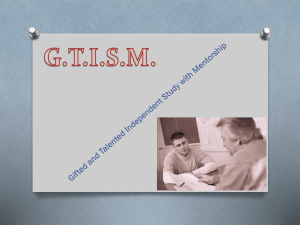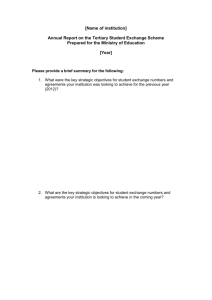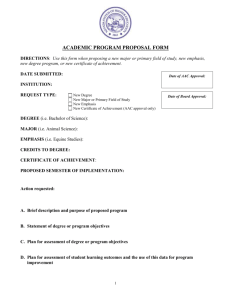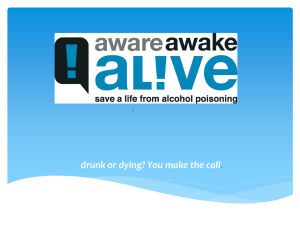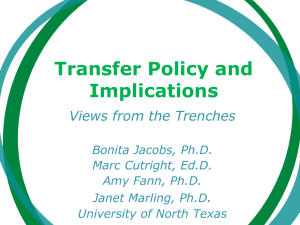CC transfer student survey
advertisement
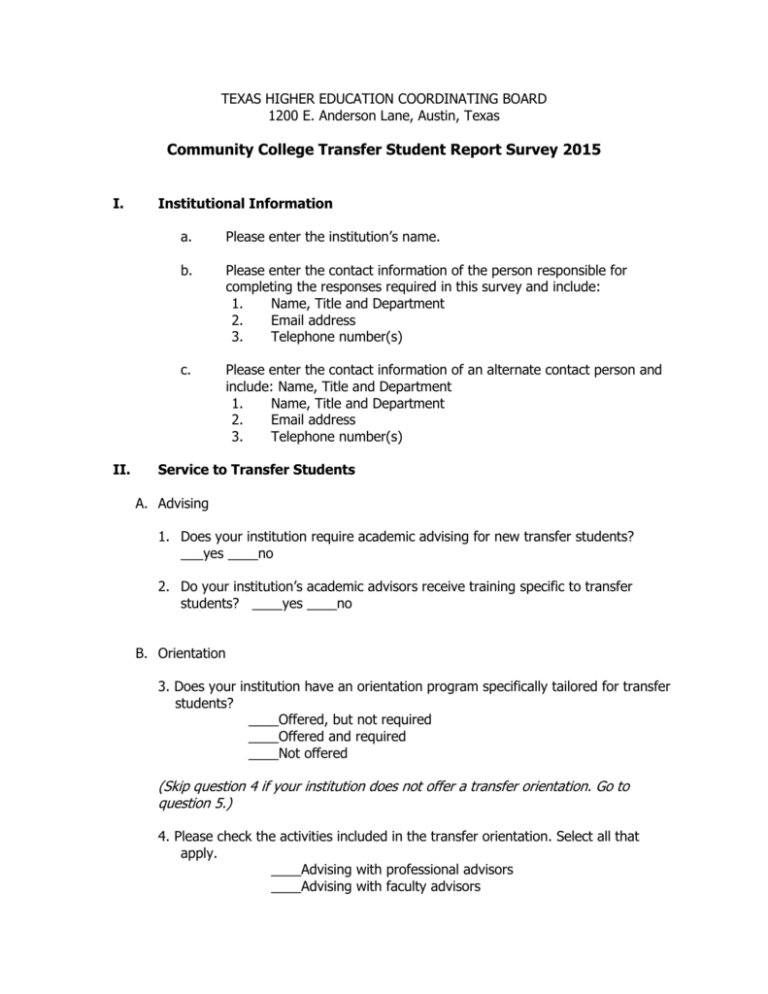
TEXAS HIGHER EDUCATION COORDINATING BOARD 1200 E. Anderson Lane, Austin, Texas Community College Transfer Student Report Survey 2015 I. II. Institutional Information a. Please enter the institution’s name. b. Please enter the contact information of the person responsible for completing the responses required in this survey and include: 1. Name, Title and Department 2. Email address 3. Telephone number(s) c. Please enter the contact information of an alternate contact person and include: Name, Title and Department 1. Name, Title and Department 2. Email address 3. Telephone number(s) Service to Transfer Students A. Advising 1. Does your institution require academic advising for new transfer students? ___yes ____no 2. Do your institution’s academic advisors receive training specific to transfer students? ____yes ____no B. Orientation 3. Does your institution have an orientation program specifically tailored for transfer students? ____Offered, but not required ____Offered and required ____Not offered (Skip question 4 if your institution does not offer a transfer orientation. Go to question 5.) 4. Please check the activities included in the transfer orientation. Select all that apply. ____Advising with professional advisors ____Advising with faculty advisors ____Registration ____Student organizations’ presentations ____Assignment of student mentors ____Assignment of faculty/staff mentors ____Financial aid advising ____Meetings specific to academic program majors ____Campus tour ____Meal ____Parent/family participation and sessions ____Other (Please briefly describe below.) 5. What percentage of your institution’s transfer students participated in an orientation program for the 2014-2015 school year? ____% C. Outreach and Success Programs 6. What outreach efforts, if any, did your institution conduct on the campuses of your community college partners during the 2014-2015 school year? (Select all that apply.) ____Recruitment ____Advising ____Other (Please briefly describe below.) ____No outreach effort conducted 7. List any new transfer student success programs initiated for the first time in 2014-2015. 8. How does your institution facilitate assimilation of transfer students during their first semester of attendance? 9. How does your institution provide support to new transfer students to encourage persistence during their first year of attendance? D. Website 10. Does your institutional website have a section for information tailored to the needs of transfer students? If yes, provide the URL. (Skip question 11 if there is not a transfer-specific section on your institution’s website. Go to question 12.) 11. Please indicate the items included on the institutional website for transfer students. Select all that apply. ____Minimum grade point average (GPA) required for transfer admissions. ____Minimum semester credit hours a student is required to have to be considered for transfer admissions. ____Number of semester credit hours students are required to take in residence at your institution for graduation. ____Degree program guides that include Texas Common Courses Numbers (TCCNS). ____A listing of all common courses taught at the institution by both the common and local course number. This may be a list or interactive database. ____Scholarship and financial aid information specific to community college transfer students. ____Other information. Please briefly describe below. 12. Please provide minimum GPA for transfer admissions. ____ 13. Please provide minimum semester credit hours for transfer admissions. ____ 14. Please provide academic residency semester credit hours required for graduation. ____ E. Financial Aid 15. What percentage of total undergraduate financial aid went to transfer students during the 2014-15 school year? ____% 16. What percentage of transfer students received financial aid? ____% 17. What was the average amount of financial aid awarded per transfer student? $____________ 18. Does your institution have institutional or departmental scholarships designated specifically for community college transfer students? _____yes _____no (Go to question 20 if you answered no to question 18.) 19. What percentage of transfer students received an institutional or departmental scholarship designated specifically for community college transfer students during the 2014-2015 school year? ____% III. Transfer Pathways A. Academic and Workforce Articulation Agreements Articulation agreements should include course equivalencies and specific degree program applicability of courses and are signed by institutional representatives. Multiple transfer planning guides/degree guides attached to a general transfer agreement do not count as separate agreements. 20. Were any articulation agreements with Texas community colleges executed for the first time during the 2014-2015 school year? ___yes ____no (Go to question 22 if you answered no to question 20.) 21. How many new articulation agreements were executed during the 2014-2015 school year? _____ 22. Were any existing articulation agreements with Texas community colleges updated during the 2014-2015 school year? ____yes ____no 23. What is the total number of articulation agreements currently in effect with Texas community colleges? _____ 24. How many academic (AA, AS, AAT) articulation agreements are currently in effect? _____ 25. How many workforce (AAS) articulation agreements are currently in effect? _____ 26. What is the number of Texas community colleges with which your institution has at least one articulation agreement? ____ B. Dual Admission Agreements (DAA). DAAs are formal agreements between a twoyear and a four-year institution to jointly admit eligible students in order to ensure a seamless transfer. 27. Were any new dual admission agreements with Texas community colleges executed for the first time during the 2014-2015 school year? ____yes ____no 28. What is the number of Texas community colleges with which your institution has at least one DAA? _____ C. Faculty Participation 29. How many of your faculty have ever received training specific to the following statewide transfer initiatives? Give the number of faculty for all that apply. ____Texas Core Curriculum ____Field of Study Curriculum ____Texas Tuning Project ____Voluntary Transfer Compacts ____ACGM Learning Outcomes Project ____None of the above 30. How does your institution encourage faculty participation in statewide initiatives that aim to improve transfer? 31. How many “vertical teaming” meetings did your institution’s faculty members have with two-year college faculty to align program and course requirements during the 2014-15 school year?______ 32. How many degree programs had faculty who participated in “vertical teaming” meetings with community college faculty to align program and course requirements during the 2014-15 school year? ______ IV. Barriers to Transfer 33. The following have been identified as barriers to transfer. Not all may apply to your institution. Please select only those experienced at your institution and rank the applicable items based on how problematic the issues are at your institution, with “1” being most problematic, “2” being the next most problematic and so on. If all issues are selected, “10” will represents least problematic. ___Lack of timely and/or accurate transcript evaluation ___Lack of financial support for transfer student ___Lack of resources at your institution to facilitate transfer of students from community colleges ___Inaccurate and/or inadequate advising at the community college ___Lack of available academic programs to meet transfer students’ needs ___Inadequate course scheduling and/or course rotations to meet the needs of new transfer students ___Program admission requirements that are different from your institution’s admission requirements ___Lack of course and program alignment with community colleges ___Students transferring with excessive hours ___Programs at capacity at your institution 34. Please list and describe additional significant barriers not included in the above list for ranking. 35. During the 2014-2015 school year, did your institution address and successfully resolve any systemic barriers to transfer that occurred at your institution? ____yes ____no (Go to question 37 if you answered no to question 35.) 36. Please describe the systemic barriers to transfer which were addressed during the 2014-2015 school year and explain the resolution. 37. Are there any emerging issues at your institution that you see likely to cause barriers to transfer in the future? Please describe in detail.



